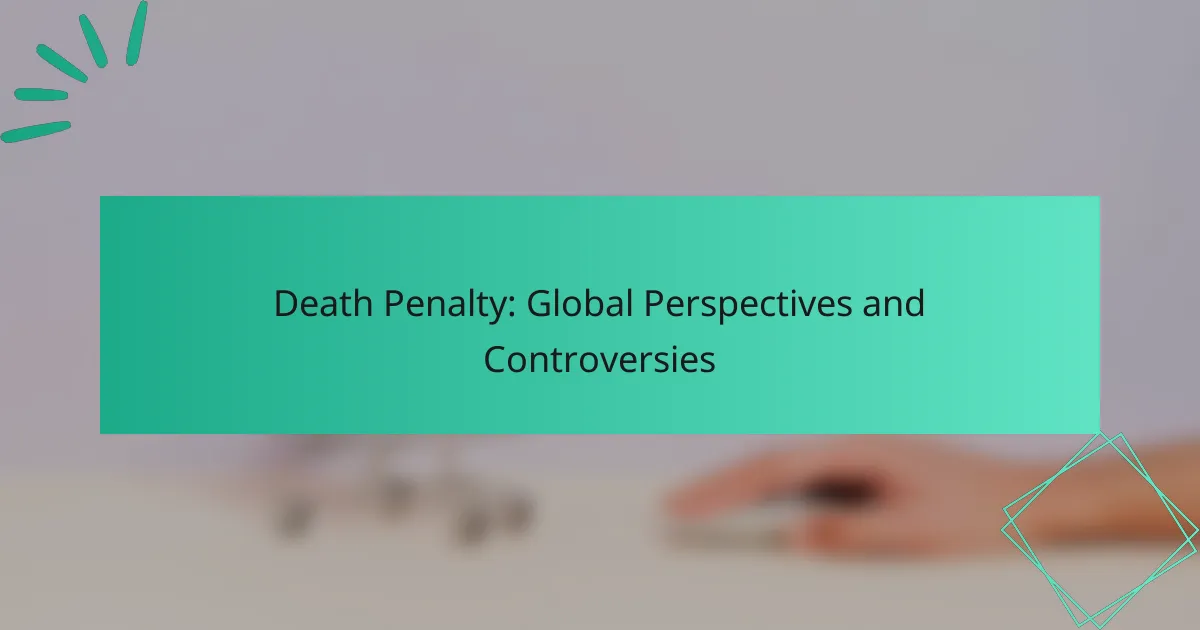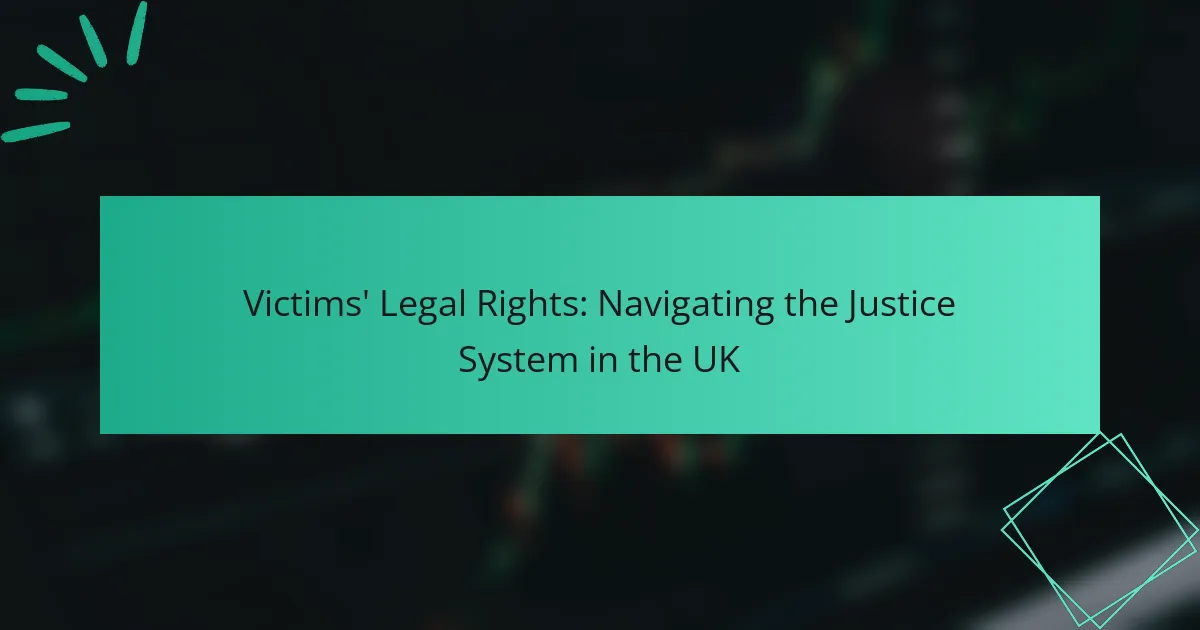The death penalty remains a deeply divisive issue worldwide, with trends indicating a decline in its use in many regions, while others, particularly in Asia, see an increase in executions. Advocates argue for its deterrent effect and justice delivery, while opponents raise ethical concerns and the risk of wrongful convictions. This complex landscape reflects a variety of cultural, legal, and political factors that shape public opinion and the application of capital punishment across different countries.
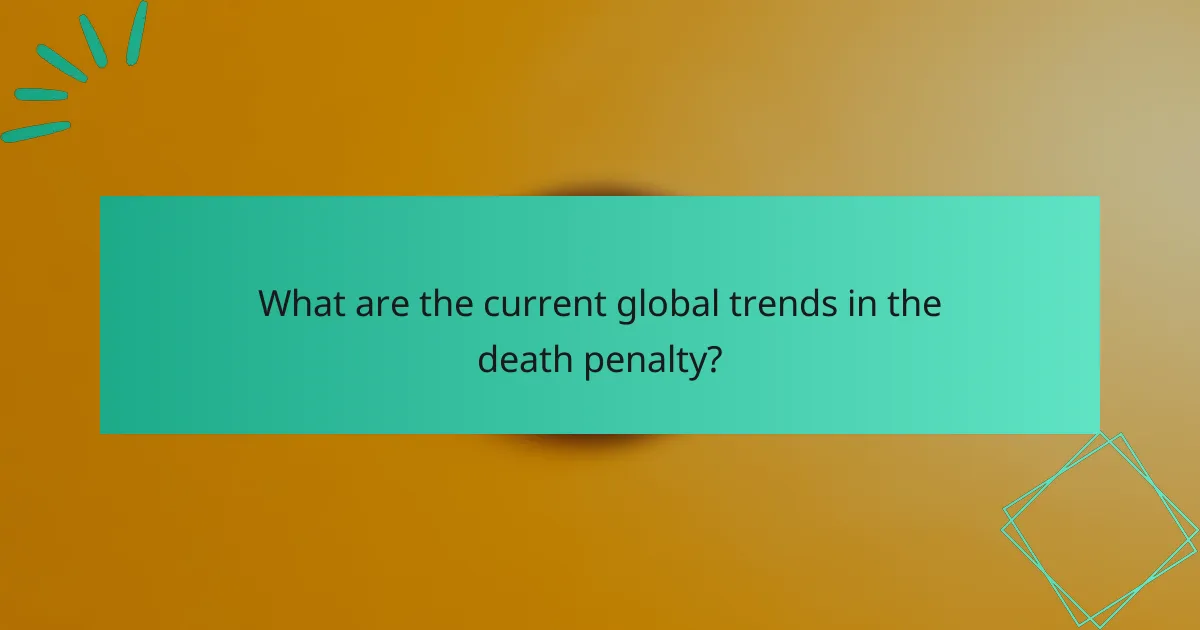
What are the current global trends in the death penalty?
Current global trends in the death penalty show a significant decline in its use in many regions, while some areas, particularly in Asia, are experiencing an increase in executions. Public opinion is also shifting, especially in the United States, where debates around the death penalty continue to evolve.
Decline in usage in Europe
In Europe, the death penalty has largely been abolished, with the European Union mandating its elimination as a condition for membership. Most countries have not executed anyone in decades, reflecting a strong commitment to human rights and the belief in rehabilitation over retribution.
Countries like France, Germany, and the UK have not only abolished capital punishment but have also actively campaigned against it globally. This trend highlights a broader societal shift towards viewing the death penalty as an outdated and inhumane practice.
Increased executions in Asia
In contrast, several Asian countries, including China, Iran, and Saudi Arabia, have seen an increase in executions. China remains the world leader in executions, though exact figures are state secrets, estimates suggest thousands are carried out annually.
Factors contributing to this trend include strict laws against drug trafficking and violent crime. Countries like Japan and India also maintain the death penalty, with occasional executions sparking national and international debate about their efficacy and morality.
Shifts in public opinion in the United States
In the United States, public opinion on the death penalty is shifting, with a growing number of people opposing it. Recent surveys indicate that support for capital punishment has decreased, with many Americans favoring life imprisonment without parole as an alternative.
Factors influencing this change include concerns about wrongful convictions, racial disparities in sentencing, and the high costs associated with death penalty cases. As states reevaluate their policies, some have enacted moratoriums or abolished the death penalty altogether, reflecting a significant transformation in the national conversation around this issue.
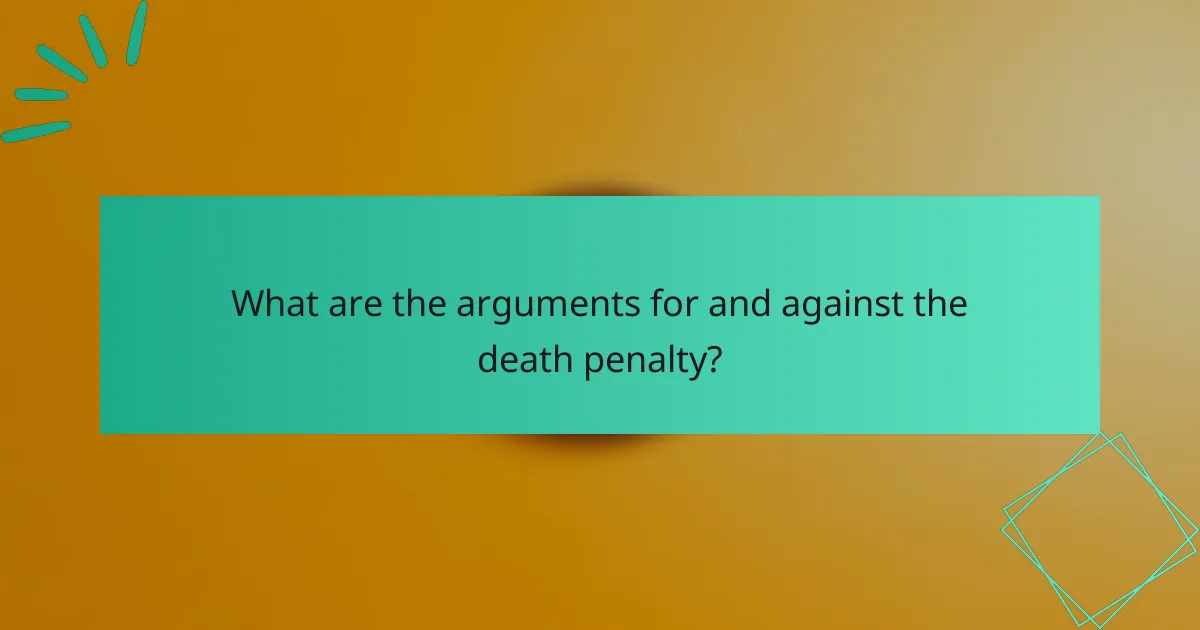
What are the arguments for and against the death penalty?
The death penalty has both strong advocates and vocal opponents, with arguments centering on its effectiveness, morality, and the potential for irreversible mistakes. Proponents argue it deters crime and delivers justice, while opponents highlight ethical concerns and the risk of wrongful convictions.
Deterrence of crime
Supporters of the death penalty argue that it serves as a deterrent to serious crimes, particularly murder. The belief is that the fear of execution may prevent individuals from committing heinous acts, thereby contributing to public safety.
However, studies on the effectiveness of the death penalty as a deterrent yield mixed results. Some research suggests that states with capital punishment do not experience significantly lower crime rates compared to those without it, indicating that other factors may play a more crucial role in deterring crime.
Moral and ethical considerations
The moral implications of the death penalty are hotly debated. Advocates argue that it is a just punishment for the most egregious offenses, serving as a form of retribution for victims and their families.
Conversely, opponents claim that taking a life, even in the name of justice, is inherently wrong. They argue that the state should not engage in the same behavior it seeks to punish, and that life imprisonment can serve as a more humane alternative.
Risk of wrongful convictions
One of the most significant arguments against the death penalty is the risk of wrongful convictions. Cases have emerged where individuals sentenced to death were later exonerated, often due to new evidence or flawed legal processes.
The irreversible nature of capital punishment raises concerns about executing innocent people. Legal experts advocate for reforms in the justice system to minimize errors, emphasizing the need for rigorous standards in capital cases to protect against such tragic outcomes.
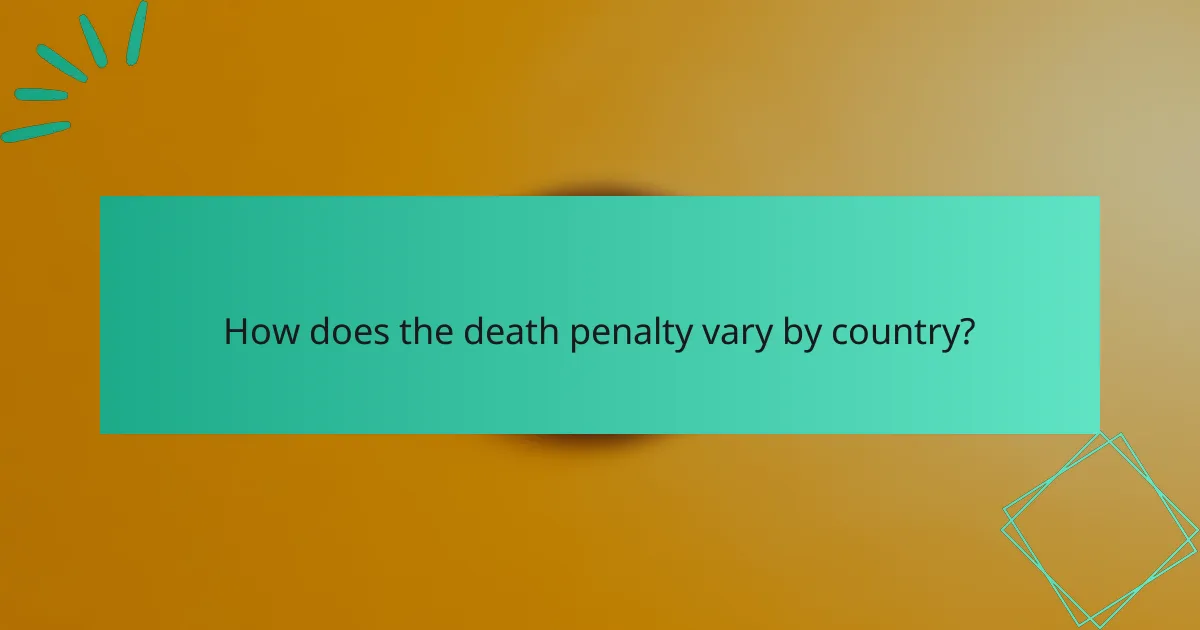
How does the death penalty vary by country?
The death penalty varies significantly across countries, with some nations abolishing it entirely while others maintain it as a legal form of punishment. The application, methods, and public opinion surrounding capital punishment differ widely, reflecting cultural, legal, and political factors unique to each country.
Countries that have abolished the death penalty
Many countries have abolished the death penalty, often citing human rights concerns and the potential for wrongful convictions. In Europe, for instance, nearly all nations have eliminated capital punishment, with the European Union mandating its abolition for membership. Notable examples include Canada, Australia, and the majority of Latin American countries.
In Africa, several countries have also moved to abolish the death penalty, including South Africa and Mozambique. However, some nations retain it on the books but have not executed anyone for years, reflecting a de facto moratorium.
Countries that still actively use the death penalty
Several countries continue to actively implement the death penalty, often for serious crimes such as murder, drug trafficking, and terrorism. The United States is one of the few Western democracies that still practices capital punishment, with states like Texas and Florida frequently carrying out executions.
In Asia, countries like Japan and India maintain the death penalty, though executions are relatively rare. In contrast, nations such as Saudi Arabia and Iran carry out numerous executions annually, often in public, reflecting different cultural attitudes toward justice and punishment.
Notable case studies: China, Iran, and the USA
China is believed to execute more people than any other country, although exact figures are state secrets. The death penalty is applied for a wide range of crimes, and the government has been criticized for lack of transparency and due process in capital cases.
Iran also has a high execution rate, particularly for drug-related offenses, and often conducts public executions. The legal framework allows for severe penalties, which are justified by the government as necessary for maintaining public order.
In the USA, the death penalty is a contentious issue, with significant variation between states. Some states have abolished it, while others actively pursue capital punishment, leading to ongoing debates about its morality, effectiveness, and the risk of wrongful executions.
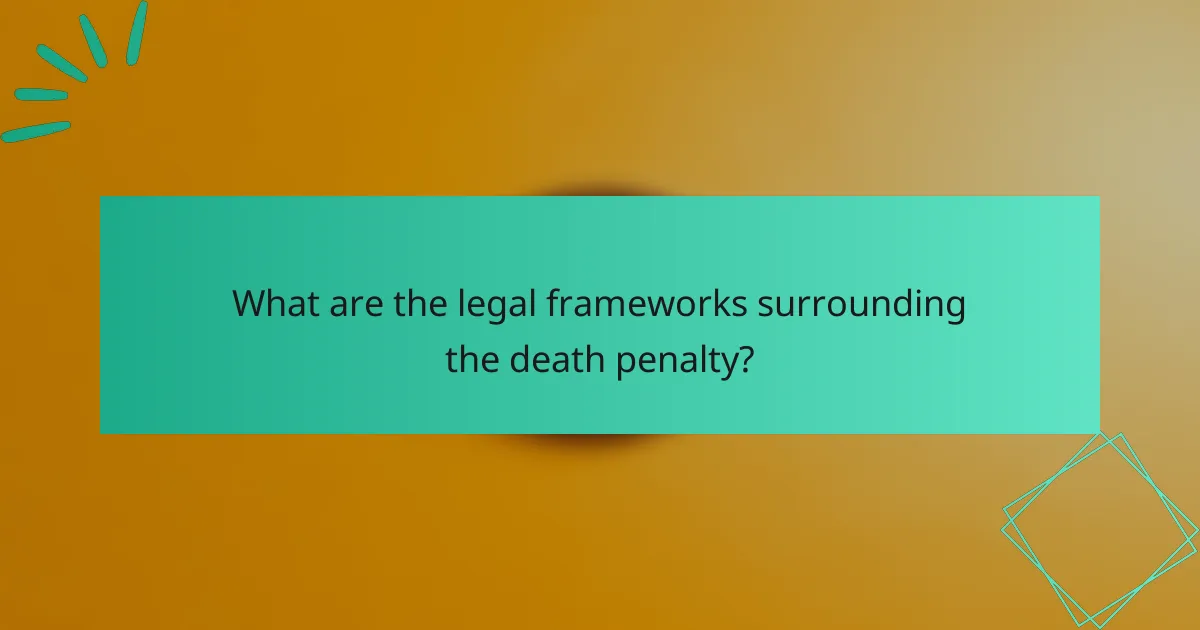
What are the legal frameworks surrounding the death penalty?
The legal frameworks surrounding the death penalty vary significantly across different countries and regions, influenced by international treaties, national laws, and cultural attitudes. While some nations have abolished it entirely, others maintain it as a legal form of punishment, often with specific regulations governing its application.
International human rights laws
International human rights laws play a crucial role in shaping the legal frameworks of the death penalty. Instruments such as the International Covenant on Civil and Political Rights (ICCPR) advocate for the abolition of capital punishment, emphasizing the right to life and the prohibition of cruel, inhuman, or degrading treatment. Countries that are signatories to these treaties are encouraged to limit the use of the death penalty or abolish it altogether.
Additionally, the United Nations has established guidelines that recommend the death penalty be imposed only for the most serious crimes, and even then, with strict procedural safeguards. These guidelines aim to ensure fairness and transparency in judicial processes involving capital punishment.
Regional legal variations in Europe and Asia
In Europe, the death penalty is largely abolished, with the European Convention on Human Rights prohibiting its use among member states. Countries like France and Germany have long since removed capital punishment from their legal systems, reflecting a strong regional consensus against it. However, some Eastern European nations still retain it in law, though it is rarely applied.
In contrast, Asia presents a mixed picture regarding the death penalty. Nations such as Japan and India maintain it, often for serious offenses like murder or terrorism. Legal frameworks in these countries include specific procedures for appeals and clemency, but the application can vary widely, with some countries executing individuals at a higher frequency than others. Understanding these regional differences is essential for grasping the global landscape of capital punishment.
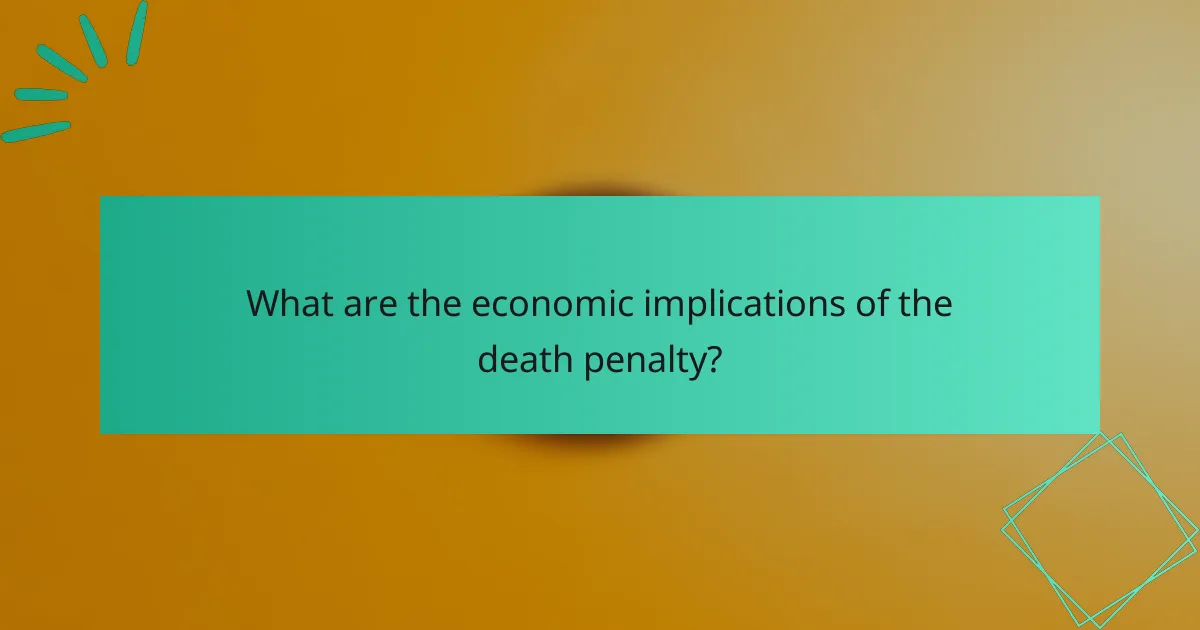
What are the economic implications of the death penalty?
The economic implications of the death penalty include significant costs associated with legal proceedings, incarceration, and execution compared to life imprisonment. These financial burdens can strain state budgets and divert resources from other critical areas such as education and public safety.
Cost of capital punishment vs. life imprisonment
The cost of capital punishment is often much higher than that of life imprisonment. Legal fees, lengthy trials, and extended appeals can lead to expenses in the low millions of dollars per case, while life imprisonment typically incurs lower costs over time, often amounting to hundreds of thousands to a few million dollars depending on the jurisdiction.
For instance, states like California have reported costs exceeding $300 million per execution when factoring in all associated expenses. In contrast, life sentences without parole can be managed for significantly less, making the financial argument against the death penalty compelling for many policymakers.
Impact on the justice system
The death penalty can create a backlog in the justice system due to the extensive legal processes involved. Cases often require more resources and time, which can delay justice for other defendants and victims awaiting resolution of their cases.
Moreover, the focus on capital cases can lead to disparities in how justice is administered. Resources may be disproportionately allocated to death penalty cases, potentially undermining the overall effectiveness of the justice system and affecting public trust.
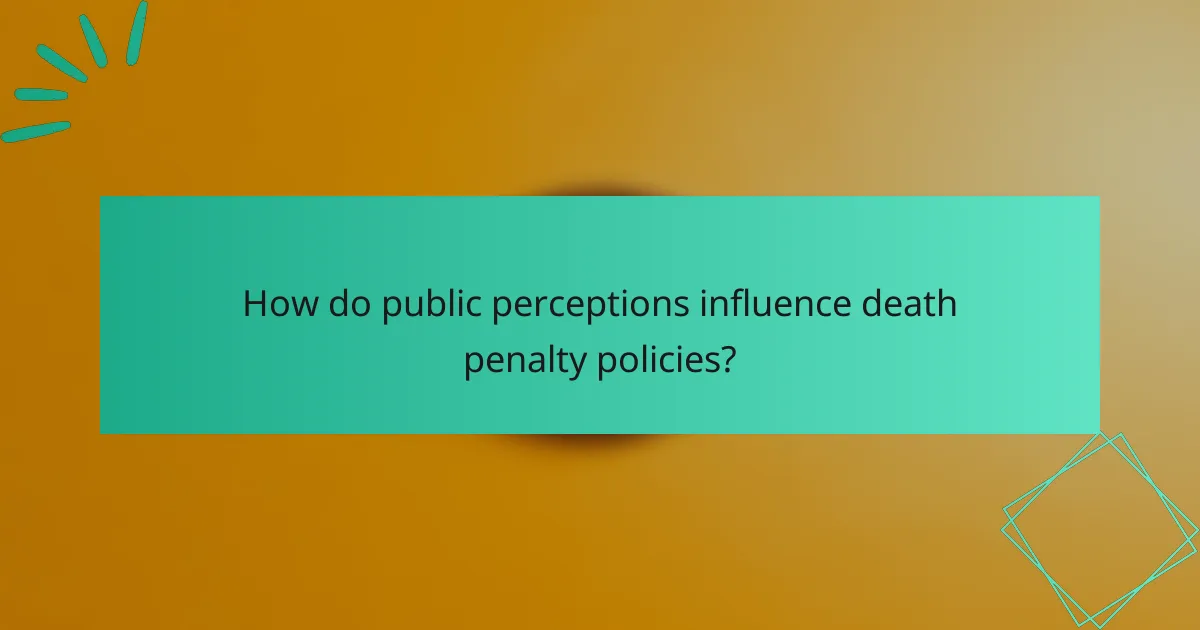
How do public perceptions influence death penalty policies?
Public perceptions significantly shape death penalty policies by influencing lawmakers and judicial decisions. When a majority of the population supports capital punishment, it often leads to its continuation or expansion, while growing opposition can prompt reforms or abolition.
Polling data on public support
Polling data reveals that public support for the death penalty varies widely by region and over time. In some countries, support can be as high as 70-80%, while in others, it may drop to below 50%. These fluctuations often reflect broader societal attitudes towards crime and punishment.
For instance, in the United States, surveys indicate that support for the death penalty has declined in recent years, with many respondents favoring life imprisonment without parole as an alternative. This shift can impact legislative actions and judicial rulings regarding capital punishment.
Media influence on public opinion
The media plays a crucial role in shaping public opinion on the death penalty by framing narratives around crime, justice, and morality. Coverage of high-profile cases often sways public sentiment, either reinforcing support for capital punishment or highlighting its potential injustices.
For example, sensationalized reporting on violent crimes can lead to increased calls for harsher penalties, including the death penalty. Conversely, investigative pieces that expose wrongful convictions or racial biases can foster skepticism and push for policy changes aimed at abolition or reform.
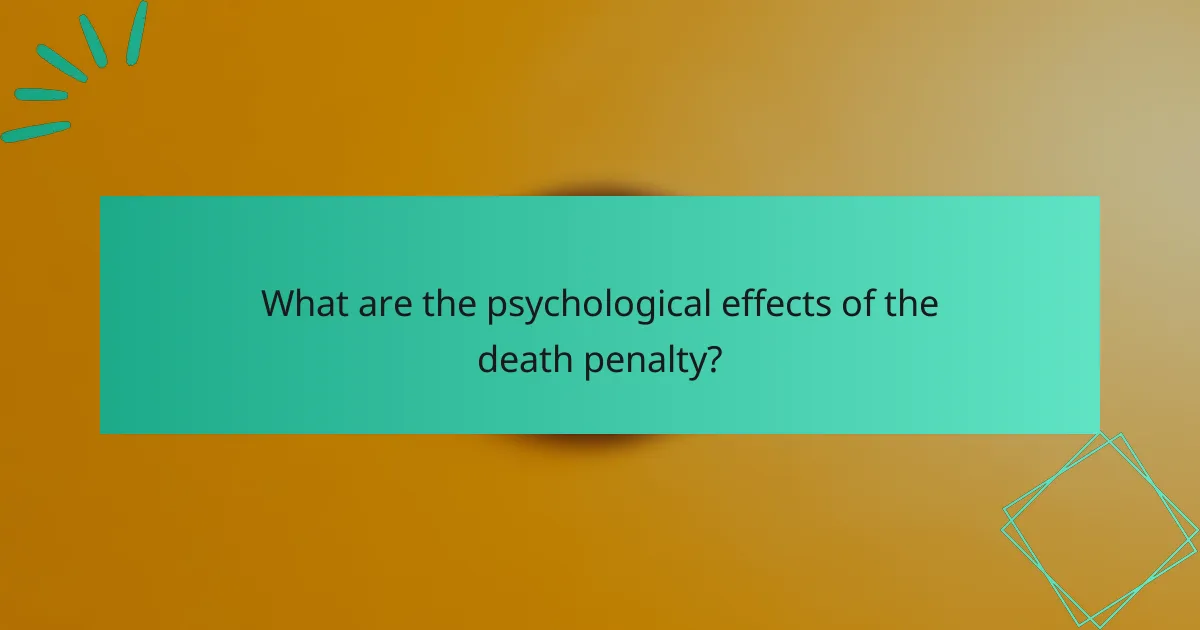
What are the psychological effects of the death penalty?
The psychological effects of the death penalty can be profound and multifaceted, impacting not only those directly involved but also society at large. It can lead to emotional distress, trauma, and moral dilemmas among various stakeholders, including victims’ families and execution personnel.
Impact on victims’ families
Families of victims may experience a complex mix of emotions, including relief, anger, and sadness, following an execution. While some may feel a sense of closure, others might struggle with feelings of guilt or the belief that the death penalty does not truly bring justice.
Additionally, the prolonged legal processes leading up to an execution can exacerbate trauma, as families are often subjected to repeated reliving of the crime during trials and appeals. This can lead to increased anxiety and mental health issues among these individuals.
Effects on those involved in executions
Individuals who participate in executions, such as executioners and prison staff, often face significant psychological burdens. Many report feelings of guilt, moral conflict, and emotional distress, which can lead to long-term mental health issues, including depression and post-traumatic stress disorder (PTSD).
Support systems and counseling are crucial for these individuals, as the act of carrying out a death sentence can create a heavy emotional toll. Some jurisdictions have begun to recognize these effects and are implementing measures to provide psychological support for execution personnel.
